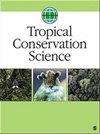Actors’ Perceptions of Profitability Along a Bushmeat Commodity Chain in West Africa (Southern Benin)
IF 1.6
4区 环境科学与生态学
Q2 BIODIVERSITY CONSERVATION
引用次数: 0
Abstract
Background and Research Aims: The bushmeat trade is one of the main drivers of faunal extinction in tropical Africa. We assess the profitability of the bushmeat trade along the commodity chain in southern Benin and study the perceptions of the actors on the profitability of the trade. Methods: Data were collected through direct interviews. A total of 120 bushmeat trade actors were interviewed in southern Benin. Economic and financial indicators were estimated and compared using descriptive statistics. Factors affecting the actors’ perception of wild animal hunting, trading or supply sustainability were assessed using binary logit. Results and discussion: A total of 15 species were traded along the bushmeat commodity chain in southern Benin. During the dry season, hunters’ gross product is higher because of greater hunting effort, and traders earn more commercial margin. Throughout the chain of actors, bushmeat trade profitability is seen as positively affected by the number of hunters per household and the availability of large preys (hunters), household size (sellers) and monthly income (consumers); whereas negative factors affecting profitability are distance from hunting sites (hunters), supply issues (sellers) and the cost of the meat (consumers). Both hunters and consumers see hunting and trade regulation measures as negatively impacting bushmeat profitability. Conclusion and implications for conservation: The perception of profitability by bushmeat commodity chain actors in southern Benin is conditioned by a set of socio-economic factors that should be considered in national conservation policies and development programs to keep bushmeat hunting profitable and sustainable.西非(贝宁南部)野生肉类商品链参与者对盈利能力的看法
背景与研究目的:丛林肉类贸易是热带非洲动物灭绝的主要原因之一。我们沿着贝宁南部的商品链评估了丛林肉贸易的盈利能力,并研究了参与者对贸易盈利能力的看法。方法:通过直接访谈收集数据:通过直接访谈收集数据。在贝宁南部共采访了 120 名丛林肉贸易参与者。利用描述性统计对经济和财务指标进行了估算和比较。使用二元对数法评估了影响参与者对野生动物狩猎、贸易或供应可持续性看法的因素。结果与讨论:在贝宁南部的丛林肉类商品链中,共有 15 个物种进行交易。在旱季,狩猎者的总产值较高,因为狩猎力度更大,而贸易商则赚取更多的商业利润。在整个行动者链中,丛林肉类贸易的盈利能力受到每户猎人数量和是否有大型猎物(猎人)、家庭规模(销售商)和月收入(消费者)的积极影响;而影响盈利能力的消极因素则是距离狩猎地点的远近(猎人)、供应问题(销售商)和肉类成本(消费者)。狩猎者和消费者都认为狩猎和贸易监管措施对丛林肉的盈利能力有负面影响。结论及对保护的影响:贝宁南部丛林肉类商品链参与者对盈利能力的看法受到一系列社会经济因素的制约,国家保护政策和发展计划应考虑这些因素,以保持丛林肉类狩猎的盈利性和可持续性。
本文章由计算机程序翻译,如有差异,请以英文原文为准。
求助全文
约1分钟内获得全文
求助全文
来源期刊

Tropical Conservation Science
BIODIVERSITY CONSERVATION-
CiteScore
3.60
自引率
5.90%
发文量
16
审稿时长
>12 weeks
期刊介绍:
Tropical Conservation Science is a peer-reviewed, open access journal that publishes original research papers and state-of-the-art reviews of broad interest to the field of conservation of tropical forests and of other tropical ecosystems.
 求助内容:
求助内容: 应助结果提醒方式:
应助结果提醒方式:


